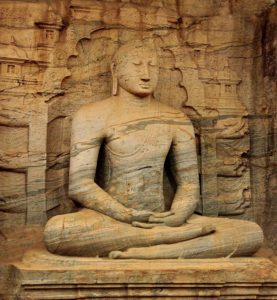静思专题
Selected articles to provide a little food for thought.
佛陀出生年代的定论
两位考古学家的直觉如何改变佛陀出生年代的定论

两位考古学家因为坚持求证他们对佛教发展史的预感而发现佛陀诞生的地方尼泊尔南部蕴藏着佛教崛起与传播的秘密。
他们追踪的过程终点是蓝毗尼圣地的挖掘。在这憎人修行的圣地,他们发觉了佛陀生于公元前六世纪的证据。这比先前的判断早了两个世纪。
Creative Ignorance
NĀGĀRJUNA ON THE ONTOLOGICAL SIGNIFICANCE OF CONSCIOUSNESS
 It is generally accepted that Nāgārjuna’s dialectic is aimed at exposing, or proving, the lack of self-nature (svabhāva) of all phenomena, all things whatsoever. The fact that this paper, for example, is dependent on the material conditions for its production (my computer, electricity, paper, my fingers, etc.), on my intention to write it, on its audience and/or readers, and so forth, suggests it has no true nature of its own. What the refutation of svabhāva actually means, both philosophically and experientially, is hotly debated; numerous views haven been suggested. Some believe the lack of svabhāva implies Nihilism, others see it as pointing to the deceptive nature of language, or even to a fundamental error which characterizes any form of knowledge. Still others view the refutation of svabhāva as being conducted from the point of view of ultimate reality, and thus as directing the mind toward the realization of an absolute truth. There are still more who doubt that Nāgārjuna had any positive philosophical message. Finally, there are those who believe the realization of the lack of self-nature to be an end in itself.
It is generally accepted that Nāgārjuna’s dialectic is aimed at exposing, or proving, the lack of self-nature (svabhāva) of all phenomena, all things whatsoever. The fact that this paper, for example, is dependent on the material conditions for its production (my computer, electricity, paper, my fingers, etc.), on my intention to write it, on its audience and/or readers, and so forth, suggests it has no true nature of its own. What the refutation of svabhāva actually means, both philosophically and experientially, is hotly debated; numerous views haven been suggested. Some believe the lack of svabhāva implies Nihilism, others see it as pointing to the deceptive nature of language, or even to a fundamental error which characterizes any form of knowledge. Still others view the refutation of svabhāva as being conducted from the point of view of ultimate reality, and thus as directing the mind toward the realization of an absolute truth. There are still more who doubt that Nāgārjuna had any positive philosophical message. Finally, there are those who believe the realization of the lack of self-nature to be an end in itself.
